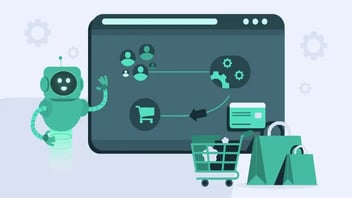What are AI Agents and Why Should I Use Them?
Gone are the days of simple chatbots; the AI revolution is ushering in a new era of autonomous agents. These digital entities, capable of performing tasks, making decisions, and interacting with the world, are poised to become our tireless assistants. Imagine having a personal AI agent tirelessly scouring the internet for the perfect travel deal, automating your mundane tasks, or even brainstorming creative concepts alongside you.
This isn't science fiction; it's the rapidly approaching reality of AI agents. From streamlining our work lives to enhancing our personal pursuits, understanding the potential of these powerful tools is no longer optional. It's essential.
What are AI Agents?
Beyond the simple definition of autonomous entities, AI agents represent a profound shift in how we interact with and leverage artificial intelligence. At their core, AI agents are sophisticated software programs designed to act independently, make decisions, and perform tasks on our behalf.
They differ significantly from traditional AI models that primarily analyze data or generate responses. Instead, AI agents take those capabilities a step further, translating understanding into action. Think of them as digital assistants with the ability to learn, adapt, and operate independently, carrying out tasks that once required human intervention.
Key Characteristics of AI Agents
Several key characteristics define the nature of AI agents:
-
Autonomy: Unlike most AI applications that require constant human input, AI agents operate with a remarkable degree of independence. They can make decisions, adapt to changing circumstances, and even initiate actions without direct instruction, freeing users from micromanagement.
-
Goal-oriented: AI agents are driven by purpose. Whether scheduling your appointments, researching a topic, or even generating creative content, they are programmed with specific objectives in mind. This focus ensures their actions remain aligned with your desired outcomes.
-
Adaptability: The ability to learn and improve over time sets AI agents apart from static programs. Through machine learning and other advanced techniques, they gather data from their interactions and use that information to refine their decision-making processes. This adaptability allows them to become increasingly effective and attuned to your needs.
-
Interaction: Effective communication is essential for any helpful assistant. AI agents excel in this area, seamlessly interacting with both humans and other digital systems. They can understand natural language instructions, provide updates on their progress, and even engage in collaborative problem-solving.
In essence, AI agents aren't just tools; they are collaborators. They represent a new frontier in artificial intelligence, one where autonomous entities work alongside us, augmenting our capabilities and transforming how we approach challenges and opportunities.
The emergence of AI agents isn't a sudden phenomenon, but rather the culmination of decades of advancements in artificial intelligence.
The Rise of AI Agents
The rise of AI agents is a testament to the relentless pursuit of creating intelligent machines capable of acting autonomously. In the early days of AI, rule-based systems dominated the landscape. These systems relied on predefined rules and decision trees to navigate specific scenarios, but their inflexibility limited their application to narrow domains.
However, the evolution of AI didn't stop there. The introduction of machine learning algorithms revolutionized the field. Suddenly, AI systems could learn from experience, identify patterns in data, and adapt their behavior accordingly. This ability to learn and improve laid the foundation for the emergence of AI agents capable of navigating complex and unpredictable environments.
The AI market in the United States is projected to reach a staggering value of $107 billion by 2030.
Advancements in natural language processing (NLP) have been crucial in enabling AI agents to understand and communicate effectively. The ability to comprehend human language, whether spoken or written, has unlocked a wealth of possibilities for interaction and collaboration.
Additionally, reinforcement learning has played a pivotal role. This technique empowers AI agents to learn through trial and error, optimizing their decision-making to achieve specific goals, much like humans do.
The advent of large language models (LLMs) has further propelled the development of AI agents. These powerful models, trained on massive datasets, possess a deep understanding of language and context, enabling them to generate human-like text, complete tasks, and even exhibit a degree of creativity.
AI Agents in Action
The capabilities of AI agents aren't confined to theory. They're being put to the test in the real world, revolutionizing how we tackle challenges and seize opportunities. Here are some prominent AI agents available today:
-
AutoGPT: This open-source project serves as a powerful testament to the capabilities of AI agents, showcasing their ability to autonomously complete a vast array of tasks. Whether it's generating marketing copy, conducting in-depth research, or even debugging code, AutoGPT demonstrates the boundless potential of these intelligent entities.
-
BabyAGI: Another shining example in the AI agent realm, BabyAGI tackles the challenge of task management and execution. By breaking down complex objectives into smaller, actionable steps, it streamlines workflows and automates processes, empowering individuals and businesses to operate with unprecedented efficiency.
-
Gemini Gems: Emerging as a potential game-changer in the AI landscape, Gemini Gems offer a glimpse into the future of personalized AI assistance. With the ability to create custom agents tailored to your specific needs, Gemini Gems empower you to access expert knowledge and support in any domain, amplifying your productivity and creativity.
These are just a few examples of a flourishing ecosystem of AI agent frameworks. As research and development continue to accelerate, we can anticipate even more sophisticated and versatile AI agents emerging, pushing the boundaries of what's possible and redefining the way we interact with technology. The rise of AI agents is an ongoing story, one that promises to reshape our world in profound ways.
Benefits and Capabilities of AI Agents
The true power of AI agents lies in their remarkable capabilities, which extend far beyond simple task execution. Let's delve deeper into some of their most transformative skills:
Task Automation
One of AI agents' most immediate and tangible benefits is their ability to automate repetitive and time-consuming tasks. Studies suggest that AI agents can improve productivity by up to 40%.
From filtering emails, scheduling appointments, managing social media accounts, and generating reports, AI agents can take on the mundane, freeing up human potential for more strategic and creative endeavors. This not only boosts productivity but also allows individuals and businesses to focus on higher-value activities.
Decision-Making
AI agents aren't just mindless automatons; they can analyze data, weigh options, and make informed decisions based on predefined goals.
By leveraging machine learning algorithms and vast amounts of data, they can identify patterns, anticipate trends, and choose the optimal course of action. This capability is invaluable in scenarios ranging from financial trading to supply chain management, where rapid and accurate decisions can make all the difference.
Learning and Adaptation
The hallmark of any intelligent system is its ability to learn and improve over time. AI agents excel in this regard, continuously refining their performance through experience and feedback. As they interact with the world and encounter new situations, they adapt their strategies, becoming increasingly effective and efficient in accomplishing their goals. This adaptability ensures that AI agents remain relevant and valuable even as the environment around them evolves.
Interaction and Collaboration
AI agents don't exist in isolation; they are designed to communicate and collaborate seamlessly with humans and other agents.
Through natural language processing and other advanced technologies, they can understand and respond to human commands, provide updates on their progress, and even engage in complex conversations. This ability to interact promotes a sense of partnership, making AI agents feel less like tools and more like trusted collaborators.
Use Cases for AI Agents
The versatility of AI agents is truly remarkable, with their potential applications spanning across a wide array of domains.
Productivity and Work
In the realm of productivity, AI agents are poised to become indispensable assistants. Imagine an AI agent that seamlessly manages your email, filtering out spam, prioritizing important messages, and even drafting responses on your behalf. A recent survey found that 72% of CX leaders expect AI agents to be an extension of their brand's identity.
Or consider an agent that intelligently schedules your meetings, coordinating with multiple calendars and finding optimal time slots. Beyond these administrative tasks, AI agents can revolutionize research and information gathering, scouring vast databases and extracting key insights in a fraction of the time it would take a human. And for content creators, AI agents can be invaluable collaborators, generating ideas, drafting blog outlines, or even assisting with coding tasks.
Personal Life
The potential of AI agents extends beyond the workplace, enriching our personal lives in various ways. Personalized recommendations, powered by AI agents that analyze our preferences and behavior, can guide us toward movies, books, and restaurants we're more likely to enjoy.
Health and fitness enthusiasts can benefit from AI-powered workout routines and progress tracking, complete with motivational nudges and personalized feedback. Plus, in the realm of smart homes, AI agents can orchestrate a symphony of automation, adjusting lights, thermostats, and appliances to create a comfortable and energy-efficient environment.
Creative Applications
The creative industries are also ripe for disruption by AI agents. Artists and designers can leverage AI tools to generate unique images, compose music, or even craft entire stories.
Game developers can use AI agents to create more dynamic and responsive virtual worlds, populated by intelligent characters and unpredictable storylines. The possibilities for creative expression with AI agents are virtually limitless, offering a fertile ground for experimentation and innovation.
The use cases for AI agents are as diverse as our imagination. From streamlining mundane tasks to empowering us to achieve more in less time, these autonomous entities are poised to transform the way we work, live, and create.
Addressing Concerns and Challenges
While the benefits of AI agents are undeniable, it's crucial to acknowledge the accompanying concerns and challenges.
Ethical Considerations
-
Bias: AI algorithms can inadvertently perpetuate biases present in their training data, leading to discriminatory outcomes.
-
Job displacement: The automation capabilities of AI agents raise concerns about job losses in certain sectors.
-
Responsible use: The deployment of AI agents requires careful consideration of ethical implications and potential misuse.
Technical Limitations
-
Potential errors: AI agents are not immune to making mistakes, misinterpreting information, or encountering unexpected situations.
-
Human oversight: The need for human intervention and guidance remains essential to ensure AI agents operate effectively and ethically.
Security and Privacy
-
Data protection: Safeguarding sensitive information handled by AI agents is critical to prevent breaches and unauthorized access.
-
Secure environments: AI agents must operate within secure frameworks to mitigate risks of hacking and cyberattacks.
Navigating these concerns will be crucial as AI agents become more prevalent. Open dialogue, responsible development, and ongoing research are essential to ensure that AI agents are harnessed ethically and safely, maximizing their benefits while minimizing potential risks.
While these concerns are valid, they shouldn't overshadow the immense potential of AI agents. By addressing these challenges head-on and prioritizing responsible AI development, we can create a future where AI agents enhance our lives in a safe and equitable manner.
The Future of AI Agents
The trajectory of AI agents is clear: exponential growth and widespread integration into our daily lives. Picture a world where AI agents seamlessly handle complex tasks, from managing your finances to planning your vacations, freeing you to pursue passions and explore new horizons. This isn't wishful thinking; it's a future that's rapidly approaching.
As AI technology continues its relentless march forward, expect to see remarkable advancements in AI agent capabilities. Natural language understanding will reach new levels of sophistication, enabling more nuanced and context-aware interactions. Decision-making algorithms will become even more refined, leveraging vast amounts of data to deliver insightful recommendations and execute complex strategies. And perhaps most excitingly, the boundaries between humans and AI agents will blur as collaboration becomes more seamless and intuitive.
The impact of AI agents on society will be profound. Industries will be transformed as automation and optimization become the norm. While concerns about job displacement persist, the rise of AI agents also presents opportunities for upskilling and the creation of entirely new job categories. Economies will evolve, driven by the efficiency gains and innovative solutions enabled by AI-powered automation. Our interactions with technology will fundamentally shift as AI agents become ubiquitous companions, anticipating our needs and seamlessly fulfilling our requests.
Preparing for this AI-powered future is essential. Individuals must embrace lifelong learning and develop the skills to effectively collaborate with AI agents. Businesses must explore how AI agents can enhance their operations, from customer service to product development. The key is to see AI agents not as a threat, but as an opportunity to unleash human potential, drive innovation, and create a more prosperous and fulfilling future for all.
Ready to harness the power of AI agents for your business? Partner with Aspiration Marketing and leverage these cutting-edge technologies and propel your business to new heights.
This content is also available in:
- German: Was ist ein KI-Agent und warum sollte man ihn verwenden?
- Spanish: ¿Qué son los agentes de IA y por qué debo utilizarlos?
- French: Agent d'intelligence artificielle C'est quoi et pourquoi l'utiliser?
- Italian: Cosa sono gli agenti AI e perché dovrei usarli?
- Romanian: Ce sunt agenții AI și de ce ar trebui să îi folosesc?
- Chinese: 什么是人工智能代理,为什么要使用它们?

Joachim is a certified HubSpot trainer with over 13 years of experience in content marketing, strategy, website development, and SEO. He has implemented numerous large-scale, international growth marketing programs, including one with UiPath, which grew from a startup to a successful IPO on the NYSE. Joachim has special expertise in multilingual marketing and sales enablement projects, and he uses the latest AI technologies to help our clients.









Leave a Comment